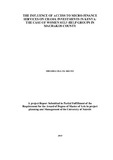| dc.description.abstract | The main objective of the study was to carry out an evaluation on the influence of
access to micro-finance services on Chama investments in Kenya focusing on the
study of women self-help groups in Machakos County. The study specifically sought:
to establish the extent to which cost of service influence the Chama investments by
women self-help groups in Machakos County, to find out if there is any relationship
between eligibility requirements by financiers and Chama investments by women
self-help groups in Machakos County, to determine whether poverty level influence
the Chama investments by women self-help groups in Machakos County and to
examine the effect of ease to use financial service on the Chama investments by
women self-help groups in Machakos County. The study reviewed previous studies
with a view to establish academic gaps which the present study sought to bridge. This
was done through library research. This study adopted a descriptive survey design and
employed quantitative research as the main approach to guide the study. The target
population for this study was women self-help groups also known as Chama
investments in Machakos County. The study sampled 47 members of the women selfhelp
groups who were selected randomly to participate. The research instrument used
in data collection was a questionnaire to draw information from the respondents. To
ensure validity of the instruments, expert opinion was sought. Data analysis was
started immediately after the field. The study found that Costs incurred by chama
members are a stumbling block in their efforts to access and benefit from financial
support by MFIs. Some of these costs include travel to and from the MFIs some of
which are located only in urban centers. The study also found out that there have been
efforts to bring down or eliminate these costs so that more poor people and especially
those in chama groups are reached. The study found that ease of access to financial
services had benefited chama members and their households. They reported buying
assets such as land, houses and public transport vehicles through support from MFIs
because of ease of access to financing. The study therefore concludes that cost of
service, eligibility requirements by financiers, poverty level, and ease of use of
financial service are factors influencing access to micro-finance services on Chama
investments in Kenya. The study recommends that MFIs must always set aside a
portion of their business to lend to people with low incomes. Stringent eligibility
requirements by MFIs should be revoked to allow more people to benefit. Training of
chama groups must be intensified so as to have groups that are well informed and thus
make worthwhile investments. Chama groups must be run professionally thus the
members must understand the vitality of keeping proper records, group dynamics and
the culture of saving. The credit officers must make regular visits to check records,
encourage and provide new knowledge. | en_US |

